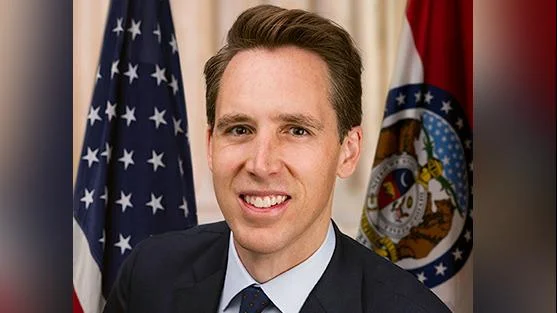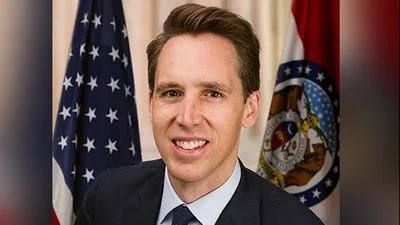U.S. Senator Josh Hawley | Official U.S. Senate headshot
U.S. Senator Josh Hawley | Official U.S. Senate headshot
U.S. Senator Josh Hawley (R-Mo.) introduced the GUARD Act, a bipartisan bill aimed at protecting children from the risks posed by AI chatbots. At a press conference in Washington, Hawley was joined by Senators Richard Blumenthal (D-Conn.), Katie Britt (R-Ala.), Mark Warner (D-Va.), and Chris Murphy (D-Conn.), who are cosponsoring the legislation.
The proposed law would prohibit companies from offering AI companions to minors, require that AI chatbots clearly disclose their non-human nature and lack of professional credentials, and establish new criminal offenses for companies that knowingly provide minors with AI companions that solicit or generate sexual content.
Parents whose children had died by suicide or engaged in self-harm following interactions with AI chatbots attended the event, along with advocacy groups supporting stricter regulation.
“AI chatbots pose a serious threat to our kids. More than seventy percent of American children are now using these AI products. Chatbots develop relationships with kids using fake empathy and are encouraging suicide. We in Congress have a moral duty to enact bright-line rules to prevent further harm from this new technology,” Senator Hawley said. “I’m proud to introduce this bipartisan legislation with tremendous support from parents and survivors that will ensure our kids are protected online.”
Senator Blumenthal added, “In their race to the bottom, AI companies are pushing treacherous chatbots at kids and looking away when their products cause sexual abuse, or coerce them into self-harm or suicide. Our legislation imposes strict safeguards against exploitative or manipulative AI, backed by tough enforcement with criminal and civil penalties. Big Tech has betrayed any claim that we should trust companies to do the right thing on their own when they consistently put profit first ahead of child safety.”
“In recent months, we have seen multiple alarming incidents involving chatbots—from encouraging suicide to engaging in sensual conversations with minors—that should give every American pause. It is our job in Congress to do everything we can to protect our children as we navigate the new reality of living in a world where AI is increasingly integrated into our lives. This legislation is a critical first step toward doing just that,” said Senator Britt.
Senator Murphy stated, “You can’t overstate the harm these AI companion chatbots pose to our kids. Nearly 70 percent of teenagers are turning to chatbots as a substitute for friendship, making them more isolated and disconnected, but what’s even scarier are the stories of chatbots encouraging young people to hurt themselves or others. Big Tech companies are fighting regulation because they want to maximize their profits by addicting our kids to their technology, no matter the cost. Our bill forces these greedy AI companies to take responsibility and implement common sense protections to keep kids from accessing these dangerous chatbots and holds those companies criminally accountable when their product pushes minors to self-harm.”
“It’s alarming to see AI chatbots contributing to incidents of self-harm among young people,” said Senator Warner. “Congress and the tech industry can’t afford to wait until more kids are hurt or more lives are lost. This bipartisan legislation will make sure clear guardrails are in place to protect kids from manipulative or dangerous chatbot interactions.”
Stefan Turkheimer, Vice President of Public Policy at Rape, Abuse & Incest National Network (RAINN), also spoke at the event: “Right now, children are allowed, and even encouraged, by tech companies to engage with AI chatbots that are mimicking affection, manipulating them, and making them vulnerable to predators on and offline. The GUARD Act will finally ensure tech companies prioritize kids’ safety instead of profits.”
The introduction of this bill comes amid growing concern about children's exposure online; recent reports indicate that most American youths interact regularly with digital platforms.





 Alerts Sign-up
Alerts Sign-up